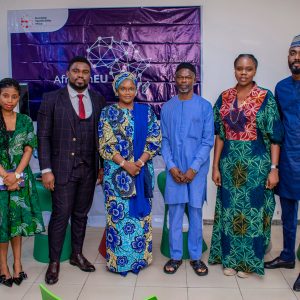







In Nigeria, certain policies have negatively impacted the innovation ecosystem either directly or through implementation failures. Some of which include the ban on bike hailing platforms like Gokada, ban of fintechs from offering bank verification number validation services, ban on cryptocurrency etc. However, there are promising developments such as the introduction of the Nigeria Startup Act and the National Blockchain Policy, which have the potential to bring about positive changes in the innovation ecosystem. We will delve into these recent policies in the remaining part of this article.
One of the outcomes of the AfriConEU project is to produce a report that provides policy recommendations to be included in the blueprint for trans-continental collaborations in Ghana, Nigeria, Tanzania and Uganda. In line with this, on May 18th, 2023, Emerging Communities Africa (ECA), a partner on the AfriConEU project, organised a policy roundtable discussion at Enspire Hub in Abuja. The event, titled “Bridging the Policy Gaps for an Inclusive Innovation Ecosystem,” brought together African policymakers from various sectors, local DIHs, startups and other European policy experts to discuss and provide policy recommendations and implementation approaches.
The event started with an introduction by Promise from Buni Hub, Tanzania, a member of the AfriConEU consortium; she provided an overview of the AfriConEU Project. During her presentation, she highlighted the upcoming boot camps that will take place in four African countries, as well as the capitalization event scheduled to be held in Europe later this year.
After Promise’s introduction, Peace Odili, the ED of ECA, gave a summary of the State of Play report, a research conducted in 2021 by ATBN in the four African ecosystems to draft evidence-based policy recommendations for collaboration between these ecosystems. Peace presentation established the context for the discussions that followed with focus on the Nigerian ecosystem.
Nwanne Nwonwu Programs Coordinator(AfriConEU Project), ECA gave a summary of the The Nigeria Startup Act (NSA), which is aimed at ensuring that Nigeria’s laws and regulations are clear, planned and work for the tech ecosystem. She gave insight to some of the benefits that the act provides such as Startup labelling(for startups less than 10 years), Startup Investment Seed fund (a minimum of ₦10B annual fund for labelled/licensed startups), Regulation Support (to ease technology transfer), Startup Engagement portal (for interaction between startups and the government) and lots more.
Adraino Mauro from DIGILOGIC a fellow member of the ICT-58 family took the stage next and gave a 20 mins presentation on how DIGILOGIC is building bridges between the islands of innovation scattered across Europe and Africa to build the first Smart Logistic Pan EU-Africa Digital Innovation Hub (DIH) fostering a broad digital transformation in the African logistics sector. His presentation highlighted some of the challenges these DIHs face including;
(i) Heavy reliance on public funding, (ii) Hardship in retaining qualified staff as they are quickly stolen by ICT industries, (iii) DIHs offer trainings that are too basic for the start ups and innovators needs, (iv) DIHs not offering test before invest services and (v) DIHs are yet to be specialised.
The final session was the panel discussion which featured Tracy Okoro – State Adoption and Domestication Lead, Nigerian Startup Act, Anderson Emmanuel – Founder Mipple Technologies Limited, Olaoluwa Olorunnisomo – Co-founder, Seedbuilders Innovation Hub, Dr Ephraim Chukwuka Okejiri – Director, National Office for Technology Acquisition and Promotion (NOTAP), and Hauwa Ibrahim Hadejia, Assistant Manager, Legal Enforcement and Regulations Unit, Nigeria Data Protection Bureau (NDPB) and was moderated by Nwanne Nwonwu.
The panel highlighted the existing disconnect between the government and startups, making it challenging for startups to thrive in Nigeria. To address this issue, the NSA team worked together to create policies that foster an enabling environment for founders and talents in the innovation ecosystem and the adoption process has started with 6 states in Nigeria already covered.
The panel also addressed the need to connect different ecosystems to facilitate the exchange of talents between them. Measures were discussed, including training and retaining the right talents through initiatives such as remote work, hourly charges, and milestone-based engagement rather than strict 9-5 working hours. It also stated that there is a concentration of ecosystems in two major cities; Lagos and Abuja, and recommended that states establish their own ecosystems to engage talents within their regions and prevent migration to the major cities.
Another important topic discussed was the National Blockchain Policy that was recently announced by the Federal Ministry of Communications and Digital Economy (FMCDE) . Mr Anderson stated that The blockchain policy is an important move by the government to accommodate blockchain innovation in the country after the ban on crypto, although there is still no clarity as to how the government intends to implement the policy.
Data privacy was also emphasised. The NDPB shared its efforts in developing a centralised database while simultaneously protecting distributed data in schools, banks, hospitals, and other sectors. They also highlighted the focus on providing data support for startups and facilitating cross-border data sharing.
Mr Olaoluwa also discussed the recently announced $618 million tech fund to support the tech and creative sectors for young investors who struggle to raise capital launched by Vice President Yemi Osinbajo under the Investment in Digital and Creative Enterprises (iDICE) programme. He stated that reaching out to the diaspora for early-stage startup investments will be a good way to raise funds for this cause and support tech4good.
The panel concluded by emphasising the need to map stakeholders beyond the tech ecosystem when implementing new policies, conducting public awareness campaigns about existing policies, making it mandatory for state-owned parastatals to engage in trans-continental partnerships bi-annually, and involving the people affected by the policies in the policy-making process. Implementation plans for policies were also emphasised as crucial for effective policy outcomes.


